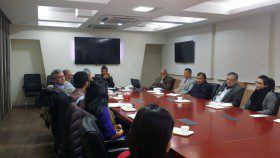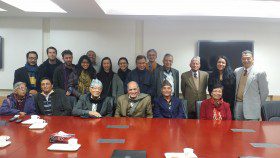 The Harvard Alumni Group of Nepal hosted its 17th monthly meeting on January 10, 2016 in Kathmandu. Professor Jayaraj Acharya, PhD, member of the Alumni Group, gave a talk on “Education in Nepal: What Went Wrong.” Dr. Acharya is a professor of English in Nepal and holds Master degrees in Sanskrit and English literature, both with Gold Medal. He was a Fulbright Scholar at Georgetown University where he got his Ph. D. in Linguistics. Dr. Acharya served as Nepal’s Permanent Representative to the United Nations from 1991 to 1994 and he was a Fellow at the Harvard Center for International Affairs in 1995.
The Harvard Alumni Group of Nepal hosted its 17th monthly meeting on January 10, 2016 in Kathmandu. Professor Jayaraj Acharya, PhD, member of the Alumni Group, gave a talk on “Education in Nepal: What Went Wrong.” Dr. Acharya is a professor of English in Nepal and holds Master degrees in Sanskrit and English literature, both with Gold Medal. He was a Fulbright Scholar at Georgetown University where he got his Ph. D. in Linguistics. Dr. Acharya served as Nepal’s Permanent Representative to the United Nations from 1991 to 1994 and he was a Fellow at the Harvard Center for International Affairs in 1995.
Addressing the question as to why Nepal has remained underdeveloped despite decades of development planning and foreign aid, Acharya said, “Nepal’s persistent status as an LDC is clearly attributable to its poor education that is divorced from the country’s development.” He compared South Korea and Nepal. South Korea was similar to Nepal in per capita income in 1960 but it has graduated from foreign aid to become one of the major economies in Asia thanks to its good education system. Nepal, on the other hand, has become an aid-addicted country. He argued that there is a strong correlation between education and development.
 Acharya then raised a question regarding quality of education. He explained that the quality of education that the country’s graduates have is so poor that a great majority of them are simply unemployable and frustrated. Acharya then expanded upon the background of this situation. He said that education was not the priority of the century-long Rana regime (1846-1951), when there were only three or four high schools in Kathmandu, and one or two colleges in the entire country. Even the first university of the country, Tribhuvan University, was established in 1960.
Acharya then raised a question regarding quality of education. He explained that the quality of education that the country’s graduates have is so poor that a great majority of them are simply unemployable and frustrated. Acharya then expanded upon the background of this situation. He said that education was not the priority of the century-long Rana regime (1846-1951), when there were only three or four high schools in Kathmandu, and one or two colleges in the entire country. Even the first university of the country, Tribhuvan University, was established in 1960.
Even as the country was planning for the development of education in the mid-1950s, the lack of a national goal was a painful reality, Acharya explained, as stated by Hugh B. Wood, who was Advisor to the National Educational Planning Commission. In an article Wood wrote in 1963 on educational planning in Nepal, he observed several problems: 1) Lack of National Goals; 2) Lack of Overall Planning; 3) Lack of Personnel; 4) Lack of Planning Data; 5) Application of Pressures; and 6) Lack of Continuity of Leadership.
Acharya said that inefficacy in national education today should encourage Nepalis to reflect. He discussed the National Education System Plan (NESP, 1971-1976), that had defined the purpose of “national education” as production of graduates with politically party-less character, and was aimed at producing self-reliant graduates with useful technical education and vocational training. The goal of education was “national development.” It required all master degree students to participate in the National Development Service (NDS) in rural Nepal as a part of their education, a program t similar to the two year Peace Corps program introduced by John F. Kennedy for American youths.
According to Acharya, “Whether really intended or un-intended, the NDS had tremendously wide-ranging impact on Nepal’s national life,” he explained. “It started bringing about a new social, cultural and economic awareness in both the rural population and student community that was very urban-centric. It was bridging the rural-urban gap and thus contributing to the national integration and nation-building process. But NDS that was started in 1974 was abruptly withdrawn in 1979 because it was bringing about too rapid and too radical changes in the country. The immediate concern was that the graduate students in rural Nepal under NDS would cause the defeat of the Panchayat system in the national referendum announced by King Birendra in 1979. They were never sent back to the countryside.”
Now in 2016, 26 years after the restoration of democracy, the country is back to square one, according to Acharya. Is the country really clear about its national goal? Why is there such an exodus of youths from the country? Why are we proud of being the alumni of foreign universities but not proud of being TU alumni? Can we establish a university in Nepal that has graduates who are proud to be its alumni? Can it be a completely privately-managed university committed to serving the public? And can it be internationally recognized?
The talk ended with thought-provoking questions and a lively discussion among the members. At the end, a silent consensus emerged about further exploration and introspection on these issues related to quality education, and its contribution to national development.
The Harvard Alumni Group in Nepal has recently been reactivated. The group’s goal is to serve as an interactive platform for proactive discussions on topical issues of national and global importance, as well as to promote professional networking among the alumni community in Nepal.
For questions about the group, please contact Bhojraj Pokharel, bhojrajpokharel@yahoo.com
